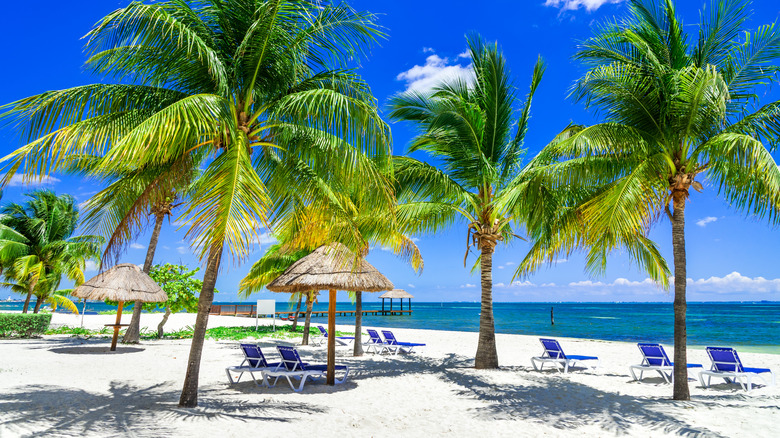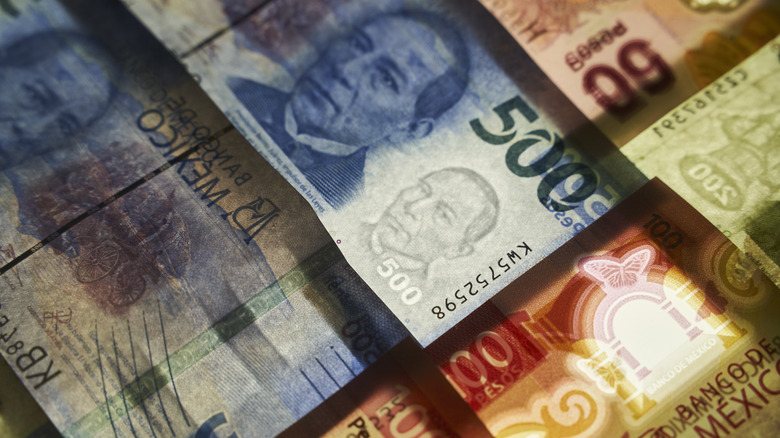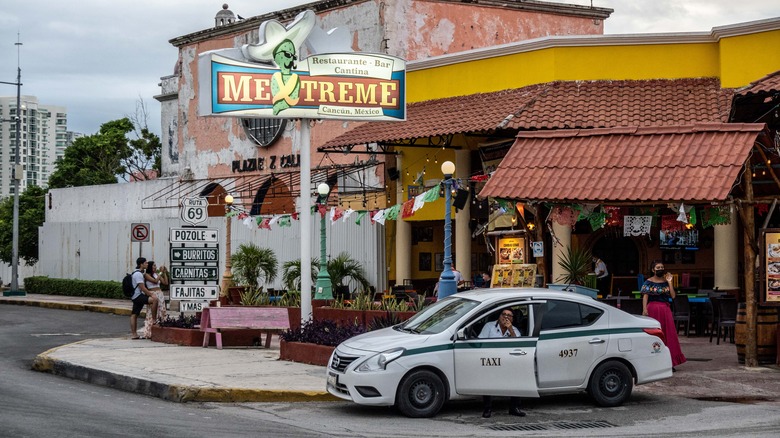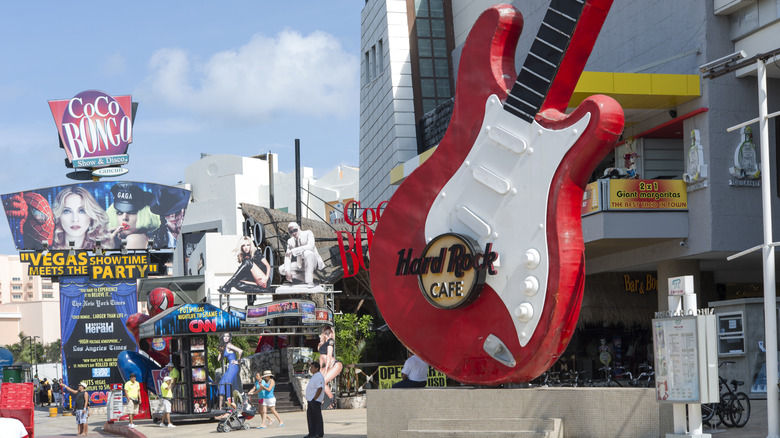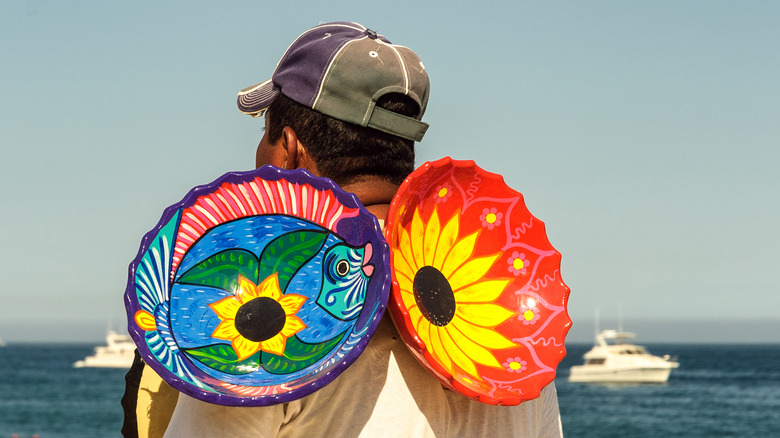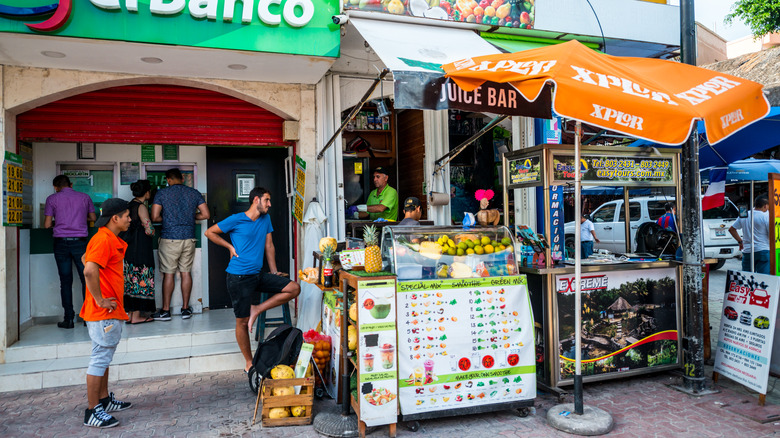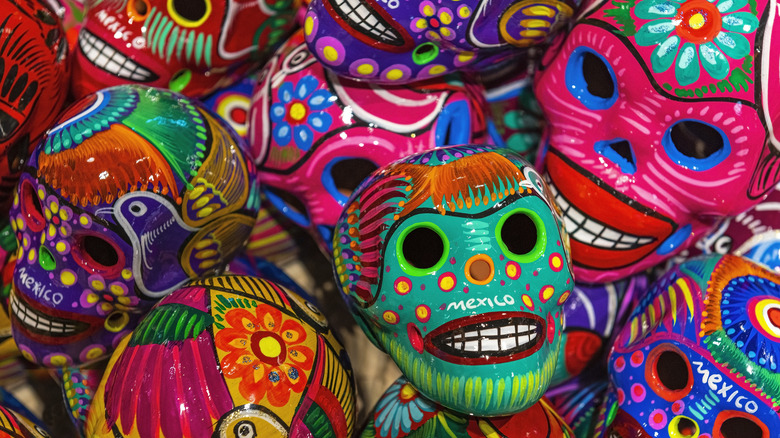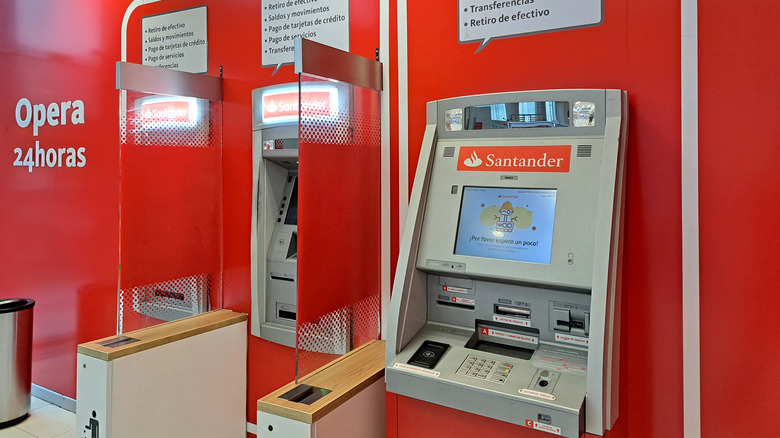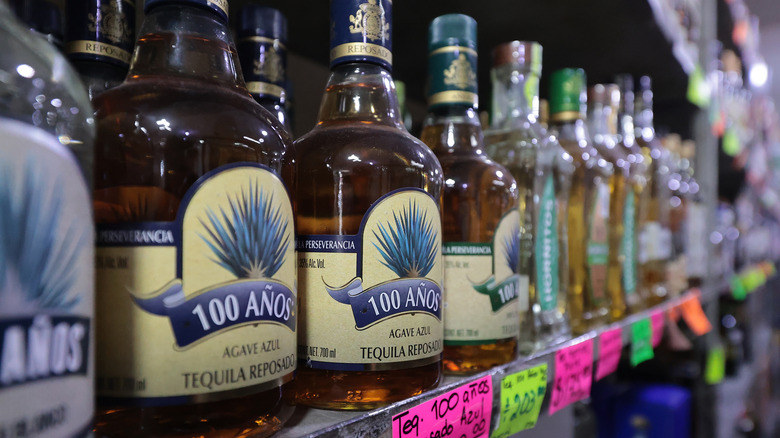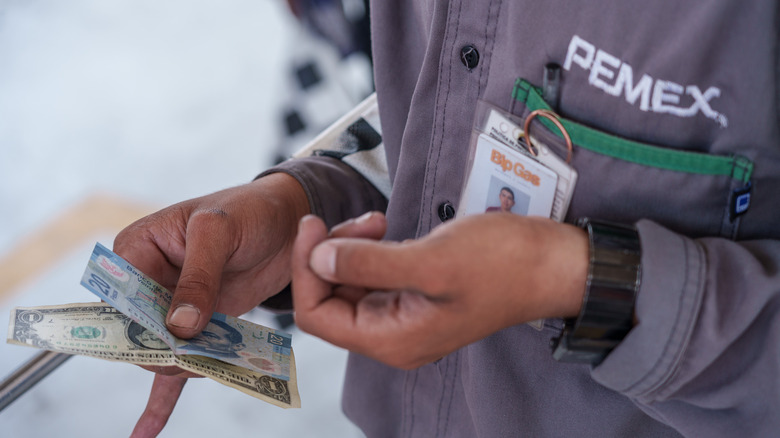13 Tourist Traps To Avoid In Cancun
Cancún is one of Mexico's most popular travel destinations. According to Tourism Analytics, nearly 25 million people flew into the Cancún airport in 2022 alone. It's easy to see what attracts travelers to this beachfront city on the Caribbean Sea. It's renowned for its stunning white sand beaches, beautiful resorts, and the plethora of activities for all types of travelers. Unfortunately, it's also known for being ultra-touristy and somewhat inauthentic. In fact, some people consider Cancún to be one giant tourist trap.
Like any heavily visited holiday spot, Cancún does have its fair share of tourist traps. From overpriced souvenir shops to dodgy tour vendors and questionable conversion rates, there are several things that can siphon your money and put a damper on your holiday. That's not to say that everything in Cancún is a rip-off. There are certainly businesses, tours, and services that do provide great value. If you know what to look out for, you can avoid losing money unnecessarily and create some great memories. These are some of the most common tourist traps to be aware of in Cancún.
Exchanging Money at the Airport
The first thing that might be on your mind when you land in Cancún is acquiring pesos. There are several money exchange desks in the Cancún International Airport that will convert a wide range of currencies into pesos. However, the exchange rates can be higher than in town. In addition, some currency exchange kiosks charge high transaction fees. While the money changers in the airport are convenient, you could end up paying more than you have to.
For more favorable rates, consider changing money at your home bank before you leave for your trip. If you're not comfortable traveling with large amounts of cash, just get enough pesos to last you through the first day or so. Once you're in Cancún, you can shop around at hotels, banks, and money changers to see which ones give the best rates. Many businesses will accept U.S. dollars as payment, but keep in mind that the rates they give might not be the best either. It's best to pay in local currency whenever possible. Credit cards are also an option at many stores, restaurants, and hotels.
Taking Taxis Everywhere
Taxis are ubiquitous in Cancún, which makes them an easy way to get around town. Just be aware that not all of them are operating legally. According to The Cancun Sun, there could be up to 750 cars passing as taxis in the Mexican Caribbean region that aren't actually licensed. Unlicensed taxis may not have proper safety features like functioning seatbelts. In addition, they may not have working meters, which makes it easy for shady drivers to overcharge you. Plus, there's no official company to report to if something goes wrong.
If you're planning on taking taxis in Cancún, there are some signs to look for that indicate a cab is legit. Official taxis in Cancún are green and white with a registration number on the side. The driver will typically be wearing a uniform with a taxi logo on the shirt. Many drivers will also have rate cards so that you can confirm the price before you travel. Budget-conscious travelers should note that the fares in the Hotel Zone can be pricey. If you want to save money, public buses and shuttles are often cheaper. Uber is also available in Cancún.
Timeshare Presentations
From the minute you exit customs in the Cancún International Airport, you'll likely be inundated with timeshare sales reps trying to convince you to attend a presentation. They often offer enticing freebies like free tours, spa treatments, or meals. It may seem like a good deal, but these presentations can eat up hours of your time. If you're not interested in buying into a vacation club or property, you probably want to avoid the timeshare presentation altogether. After all, your vacation time is limited, so why waste it listening to sales pitches?
If you do decide to attend a timeshare presentation, just know that many of the sales reps are very good at using high-pressure sales tactics to rope people into expensive sales. You may walk in thinking you're just there for the freebies and walk out with way more than you bargained for. Then there are the timeshares and vacation club deals that are simply too good to be true. The U.S. Embassy in Mexico has issued warnings about aggressive sales tactics and timeshare frauds.
Chain Restaurants
One of the great things about Cancún is that there are so many fantastic places to eat. Unfortunately, many tourists don't make it off of Cancún's main drag. Kukulcan Boulevard runs through the center of the Hotel Zone and it's packed with chain restaurants like McDonald's, Johnny Rockets, Señor Frog's, and the Hard Rock Cafe. It may be tempting to go for what's familiar and easy, but you'd be missing out on some amazing authentic Mexican food if you just stick to the chains.
There are so many incredible places to eat in Cancún that aren't the cookie-cutter variety. Explore the streets and you'll find charming taquerias, vibrant seafood spots, and fine dining restaurants serving gourmet fare. Loncheria El Pocito is renowned for its traditional Yucatan dishes like cochinita pibil (slow-cooked pork). Kiosco Verde Marisquería is the place to go for fresh ceviche and grilled fish. If you want some culinary guidance, Cancun Food Tours offers taco and street food tours that will introduce you to a wide range of local flavors.
Beach Vendors
Fun fact: There's no such thing as a private beach in Mexico. By law, all beaches are public and can be accessed by anyone. That's one of the reasons you see so many vendors along the sand on popular beaches. Beach vendors in Cancún sell everything from wooden bowls to woven blankets, cigars, and silver jewelry. You may come across some good deals, but the quality might not be great. Many of the items the beach vendors sell are mass-produced and some are not even made in Mexico.
Another thing to know about buying from beach vendors is that the initial price they ask for will probably be higher than the going rate. Bargaining is expected on most items. A common practice is to offer half of the price they suggested and take it from there. Remember to keep it light and respectful. If the vendor doesn't seem to be budging on the price and it's more than you want to pay, just politely decline. And if you don't want the item to begin with, a simple "no gracias" is fine.
Party Bars
Cancún is definitely a party town. From beach bars to salsa spots and over-the-top nightclubs, there is no shortage of places to get your drink on. Nightlife is big business here and an easy way to separate tourists from their money. Cover charges for many of the big nightclubs can be high. Some include drink credits or open-bar packages, but don't expect top-shelf liquor. Generic beer and spirits are the norm, and watered down drinks are common. You may also find that wait times for drinks can be long thanks to the crowds.
Like any place with a big party scene, there are some things to watch out for in the bars of Cancún. Some bars send shot girls around to ply people with drinks that can amp up the bill. Another way to get you to order more is to take away your drink before you're done. It's always good practice to keep your eye on your drinks wherever you go. Also, be sure to check your bill carefully at the end of the night, as you may find that there are extra drinks added on.
Booking Tours Through Street Vendors
There are plenty of people on the streets and beaches of Cancún touting tours to some of the biggest attractions in the area. You'll see signs advertising trips to Chichen Itza, cenote tours, boat trips, and zip lining. Many of the freelance operators offer prices that are far lower than what you would pay at your hotel or through an official tour company. Unfortunately, not all of them are legit.
Some tourists who book through street kiosks find that the tours they get aren't what was advertised. You may find that no meals are included when the vendor said they would be. Sometimes the safety equipment is sub-par or there are additional charges tacked on that the vendor never mentioned. Even worse, you could pay for a tour and find that you're left high and dry on the day of the tour with no way to find the vendor or get your money back. Some vendors also sell fake tickets for activities that don't exist. If you want to get the most out of your excursions, it's best to book through well-known tour agencies that have solid reputations.
Insanely Cheap Holiday Packages
One of the biggest mistakes people make when visiting Mexico is booking the cheapest holiday package they can find. Search online and you'll find tons of package deals to Cancún, some of which are incredibly inexpensive. However, if the price seems too good to be true, it probably is. It's worth doing some research to find out what the package actually entails and whether the hotel is decent or a dump. Read reviews from other travelers so that you can make an informed decision about whether it might be worth it to pay a bit more for a better-quality stay.
Travelers should also be aware that there are several fake travel agencies that offer cheap travel packages or vacation rentals in Cancún. Some request a deposit and then disappear shortly after receiving the money. Others may cancel the booking last minute, leaving you out of money and scrambling to find a place to stay. Most of these scams are advertised online with a large number of them popping up on social media platforms like Facebook and Instagram.
Overpriced Souvenir Shops
So many souvenir shops, so little time. It seems every corner in Cancún has a stall or three selling painted skulls, sombreros, margarita glasses, and other items that make for great gifts or mementos of your trip. Not all of them are worth the pesos though. Some shops will sell you poor quality goods at inflated prices. Others, like the souvenir shops in resorts and at the airport, often charge far more than what you would pay for the same items at a local market.
You can find some great souvenirs in Cancún, but you'll have to shop around to get the best prices and quality. Mercado 28 is a good place to start. This huge market has over 100 shops selling everything from glazed pottery to traditional Mexican clothing. It's a great spot to chat with the vendors to get the story behind the goods and practice your bargaining skills. Mercado Ki Huic is another popular market where you can find artisans selling textiles, jewelry, and art.
ATM Conversion Rates
Most Mexican ATMs accept foreign cards, so taking money out shouldn't be an issue. Just be aware that, in Mexico, many private ATMs — in other words, ATMs that aren't owned by banks — charge a hefty commission and offer their own conversion rate that is below the actual exchange rate. The good news is you can decline both.
Here's how it works: Once you've entered the amount you want to take out, a screen will pop up telling you how much the ATM fee is. This is the usual ATM fee most travelers get dinged with overseas. Unless you have a card that lets you avoid unnecessary bank fees, you'll have to pay this at both private and bank-owned ATMs. Accept the charge to continue with the transaction.
Following this, some banks might ask you if you want to make a donation to a charity or some other cause. You can decline this if you want. Finally, the last screen will display the bank's conversion rate and their commission fee if they charge one. You have the option to accept or decline. If you decline, you'll still get your money, but at your bank's official exchange rate.
Swimming With Dolphins
There are several places in Cancún that offer interactive dolphin shows. While the opportunity to swim with dolphins may sound like an amazing experience, it doesn't come cheap. Tickets can cost over $100 USD per person for less than an hour of swim time. Then there are the add-ons. Most places won't allow you to bring your own camera or phone into the aquarium area, so you have to pay extra for photos. In addition, you may have to pay locker fees to store your clothing and jewelry while you're swimming.
Then there are the ethical considerations. The Mexican government is actually trying to phase out dolphin shows. A recent amendment to the General Wildlife Law prohibits marine mammals from being used for anything other than scientific research or conservation efforts. The amendment hasn't been enforced yet in Cancún, but you may want to skip the dolphin show and spot sea creatures in real life instead. There are several excursions where you can swim with whale sharks, snorkel with tropical fish, or see sea turtles on some of Cancún's best beaches.
Tequila Shops
Tequila vendors are a dime a dozen in Cancún. You'll find them mostly in markets like Plaza 28 and Mercado 28, as well as some shops in the Hotel Zone. To be more accurate, they'll probably find you first and try to entice you into their shop with free samples of tequila. Sipping tequila in the market can make for a fun outing, but you can get better deals on bottles elsewhere. According to reviewers on Top Rated, the vendors at Plaza 28 are particularly bad for overcharging.
If you're looking to pick up some tequila to enjoy on your trip or take home with you, there are a few highly reputable shops in Cancún. Many have professional staff who are knowledgeable about what they're selling and stock only legitimate bottles. La Europa is a popular liquor store chain that has a wide selection of tequilas, as well as spirits, wines, and beers from around the world. For those who want to learn more about tequila, Cancun Tequila Tasting offers various tasting experiences and tours that delve into how tequila is made and all the different types of tequila.
Gas Station Scams
Renting a car is a great way to see the sights in Cancún and beyond. However, it's important to know that gas station scams are common in the region and they happen frequently around resort areas. The most common scam happens when a customer tries to pay with a credit card. The attendant will say the card didn't go through and ask for cash. In the end, the customer ends up paying twice. Other scams include swapping out bills to make it look like the customer accidentally gave a smaller bill, and not filling the tank with the right amount of gas.
There are a few things you can do to avoid being scammed at the gas station. First, make sure the pump is set to zero before the attendant starts filling up your car. Keep an eye on the meter to make sure they give you the amount that you've asked for. Try to pay in pesos if possible rather than with your credit card. When you pay, double check your bills before you hand them over to make sure you're giving the correct notes.
